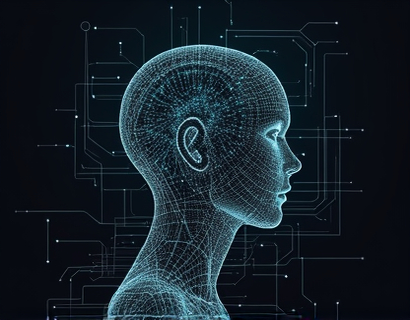Personalized AI Companions: Transforming Childhood Creativity and Emotional Well-Being with Interactive Digital Friends
In recent years, the integration of artificial intelligence in children's play and development has opened new avenues for enhancing creativity and emotional well-being. Interactive digital friends, powered by advanced AI algorithms, are becoming increasingly popular as tools to support and enrich the early years of a child's life. These AI-driven companions offer a unique blend of personalized interaction, safety, and educational value, making them a valuable addition to modern childhood.
The concept of AI companions for children is rooted in the understanding that play is a fundamental aspect of child development. Through play, children learn to express themselves, solve problems, and develop social and emotional skills. Traditional toys and games have long been used to facilitate this process, but the introduction of AI companions brings a new dimension to interactive play. These digital entities are designed to adapt to each child's unique personality, interests, and developmental stage, providing a tailored experience that fosters growth and learning.
One of the key benefits of AI companions is their ability to spark creativity. Unlike static toys, AI-driven friends can engage in dynamic conversations, tell stories, and even create art based on the child's input. This interactivity encourages children to think outside the box and explore their imagination in ways that traditional play might not. For instance, a child can collaborate with an AI companion to build a virtual world, design characters, and narrate adventures, all of which stimulate creative thinking and problem-solving skills.
Moreover, these AI companions play a crucial role in emotional development. Children often struggle to articulate their feelings and emotions, and AI companions provide a safe and non-judgmental space for expression. Through gentle prompts and empathetic responses, these digital friends help children understand and manage their emotions. For example, an AI companion might ask a child how they feel after a difficult day at school and offer comforting words or suggest activities to help them relax. This kind of emotional support can be particularly beneficial for children who may not have access to sufficient human interaction or who need additional assistance in processing their feelings.
The safety of AI companions is another significant advantage. In a world where online safety concerns are paramount, AI-driven digital friends operate within a controlled environment that prioritizes the child's well-being. These companions are designed to follow strict guidelines to ensure that interactions are appropriate and free from harmful content. Parents and guardians can rest assured that their children are engaging in a secure and monitored digital space, reducing the risks associated with traditional online interactions.
Social skills development is another area where AI companions excel. Through interactive play, children learn to communicate effectively, take turns, and understand social cues. AI companions can simulate various social scenarios, allowing children to practice these skills in a low-stakes setting. For instance, an AI friend might role-play a situation where the child needs to ask a friend to play or resolve a conflict, providing feedback and guidance to help the child navigate real-life social interactions. This kind of practice is invaluable, especially for children who may find social situations challenging or overwhelming.
The personalization aspect of AI companions is perhaps one of their most powerful features. Each child is unique, with different interests, learning styles, and emotional needs. AI algorithms analyze the child's behavior and preferences to tailor the interaction experience accordingly. This personalization ensures that the AI companion remains engaging and relevant, adapting to the child's evolving abilities and interests. For example, if a child shows a keen interest in dinosaurs, the AI companion might incorporate dinosaur-related topics into conversations and activities, keeping the child engaged and motivated to learn.
The educational value of AI companions extends beyond just entertainment. These digital friends can introduce children to various subjects and concepts in a fun and interactive way. Through storytelling, games, and educational challenges, AI companions can help children develop a love for learning and build foundational knowledge in areas such as science, math, and language. This approach not only makes learning enjoyable but also helps to bridge the gap between play and education, creating a seamless and enriching experience.
Research has shown that children who interact with AI companions exhibit improved cognitive skills, greater emotional resilience, and enhanced social competence. A study conducted by a leading child development institute found that children who regularly engaged with AI-driven digital friends showed significant improvements in areas such as vocabulary, problem-solving, and emotional regulation. These findings underscore the potential of AI companions as valuable tools in early childhood education and development.
The design and implementation of AI companions also consider the importance of human touch and emotional connection. While these digital friends are artificial, they are programmed to exhibit traits that mimic human-like behavior, such as empathy, curiosity, and warmth. This blend of technology and emotional intelligence helps to create a bond between the child and the AI companion, making the interactions feel authentic and meaningful. The goal is to complement, not replace, human interactions, but to provide an additional layer of support and engagement.
For parents and guardians, the introduction of AI companions can be a reassuring step in supporting their child's development. These digital friends offer a way to enhance playtime and learning without the need for constant supervision, allowing adults to focus on other tasks or engage in their own activities. The data and insights provided by AI companions can also be valuable for parents, offering insights into their child's interests, emotional state, and developmental progress. This information can help parents tailor their approach to better support their child's needs.
However, it is essential to approach the use of AI companions with a balanced perspective. While these digital friends offer numerous benefits, they should be used as a supplement to, rather than a substitute for, human interaction and traditional play. Parents and caregivers should continue to engage in face-to-face activities, read books together, and participate in outdoor play to ensure a well-rounded developmental experience. The integration of AI companions should enhance, not replace, the rich and varied experiences that come from human connection and exploration.
As the technology continues to evolve, the potential for AI companions to transform childhood creativity and emotional well-being is vast. Future developments may include more sophisticated emotional recognition, deeper integration with educational curricula, and expanded social interaction capabilities. The ongoing research and innovation in this field promise to bring even more value and benefits to children and their caregivers.
In conclusion, AI companions represent a promising frontier in childhood development, offering personalized, safe, and educational interactions that support creativity and emotional growth. By providing a unique and adaptive play experience, these digital friends help children navigate the complexities of growing up in a rapidly changing world. As we continue to explore and refine this technology, the potential for positive impact on childhood development remains immense.











































